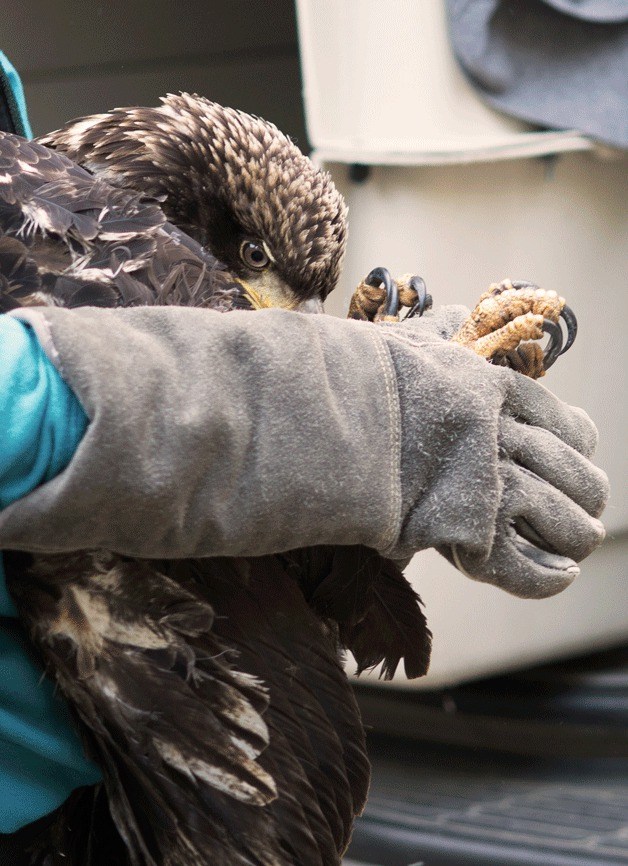A recent dinner party was so hungry it could eat a horse.
And that’s when their trouble began, as well as a tense, lifesaving tale for the West Sound Wildlife Shelter.
The Bainbridge Island-based shelter was recently inundated with six eagles, each thinly clinging to life.
The eagles fed off two horse carcasses, but the free meal turned out to be more frenzy than feast. The horses were poisonous, and the eagles took a turn for the worse.
“Some of these birds were in worse shape than others,” said Lynne Weber, wildlife rehabilitation specialist at the West Sound Wildlife Shelter.
“There were a couple we didn’t think would make it up here,” she said.
The rehabbers at the shelter were not confident any of the eagles would survive. But this weekend, however, all six will be released back into the wild.
But it wasn’t easy.
Raindance Raptors, an animal rehab shelter south of Olympia, contacted West Sound Wildlife Director Michael Pratt on March 22 after they found an eagle nearly dead.
The shelter didn’t have the resources to handle the eagle and needed advice. On the other hand, the eagle was in such bad shape that moving it was also risky.
“It was too sick to bring it here,” Weber said.
But one day later, another sick eagle came in, then four more on Sunday. Pratt and Weber didn’t waste any time and hit the road. The two West Sounders transported the eagles back to their facility on Bainbridge Island.
The state’s Department of Fish and Wildlife was called in to investigate.
“They did a fly over of the area and discovered two dead carcasses in a field,” Weber said.
A horse owner had euthanized two horses on March 20.
“Instead of disposing them as you are supposed to by law, the owner put them in the back of the property and left them,” Weber said.
The horses were put down using sodium pentobarbital, a common drug used in veterinary medicine for anesthesia, or in high doses, as a euthanizing agent.
“It runs through their blood system, so before they are deceased, it’s gone through their whole system,” Weber said. “Places like livers and hearts carry large portions of it.”
To high-flying eagles on the hunt, two dead horses were an all-you-can eat buffet. When the six eagles came upon the horses, they pulled up a seat at the table, each taking a heaping portion of the deadly drug running throughout the carcasses.
It didn’t take long for the eagles to get a case of potentially terminal ingestion. By the time Pratt and Weber found them, the damage to the birds was apparent.
After the West Sound pair made their journey back to the island, a seventh sick eagle was found. It was quickly transported to the Audubon Society in Portland.
Five of the eagles taken to the island were juveniles; three were 2-years-olds, two were 1-year-olds. The sixth was an adult.
The eagles were treated with activated charcoal to absorb the toxins in their bodies, according to Weber.
“And you treat them with lots of fluids to flush it out of their system,” Weber said. “Two of the birds were also treated with atropine, which speeds up the heart. They were so bad they needed it to keep their hearts going.”
By March 26, all the eagles were up on their talons and moved to the outside area of the shelter.
“All of the birds have recovered, to which we are amazed,” Weber said.
The seventh sick eagle sent to Portland also recovered and will soon be released.
The six eagles will be transported down to Winlock where they will be set free. Weber said that it is best to release them where they had previously been living; especially the adult eagle.
“We want to get him back down there because it’s highly possible he’s got a mate somewhere that’s really ticked off at him,” Weber said.
“He went out for dinner and didn’t come home.”


